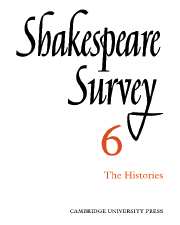Book contents
- Frontmatter
- Shakespeare's History plays: 1900-1951
- The Unity of 2 Henry IV
- Anticipation and Foreboding in Shakespeare’s Early Histories
- Middle-Class Attitudes in Shakespeare’s Histories
- A Reconsideration of Edward III
- On Producing Henry VI
- The Huntington Library
- An Early Elizabethan Playhouse
- Shakespeare Learns the Value of Money: The Dramatist at Work on Timon of Athens
- Shakespeare’s French Fruits
- An Elizabethan Eyewitness of Antony and Cleopatra?
- Othello’s “It is the cause . . .”: An Analysis
- On Translating Hamlet
- Shakespeare in China
- International Notes
- Shakespeare Productions in the United Kingdom: 1951
- Shakespeare’s History Plays - Epic or Drama?
- Festival Shakespeare in the West End
- The Year's Contributions to Shakespearian Study 1 Critical Studies
- 2 Shakespeare’s Life, Times and Stage
- 3 Textual Studies
- Books Received
- Index
- Plate Section
On Producing Henry VI
Published online by Cambridge University Press: 28 March 2007
- Frontmatter
- Shakespeare's History plays: 1900-1951
- The Unity of 2 Henry IV
- Anticipation and Foreboding in Shakespeare’s Early Histories
- Middle-Class Attitudes in Shakespeare’s Histories
- A Reconsideration of Edward III
- On Producing Henry VI
- The Huntington Library
- An Early Elizabethan Playhouse
- Shakespeare Learns the Value of Money: The Dramatist at Work on Timon of Athens
- Shakespeare’s French Fruits
- An Elizabethan Eyewitness of Antony and Cleopatra?
- Othello’s “It is the cause . . .”: An Analysis
- On Translating Hamlet
- Shakespeare in China
- International Notes
- Shakespeare Productions in the United Kingdom: 1951
- Shakespeare’s History Plays - Epic or Drama?
- Festival Shakespeare in the West End
- The Year's Contributions to Shakespearian Study 1 Critical Studies
- 2 Shakespeare’s Life, Times and Stage
- 3 Textual Studies
- Books Received
- Index
- Plate Section
Summary
[The Birmingham Repertory Theatre produced 2 Henry VI on 3 April 1951, and 3 Henry VI on 1 April 1952. The latter was taken to the Old Vic on 21 July 1952. Editor.]
Over a lengthy period of playgoing it is inevitable that certain productions of the classics make more lasting effect than others. This may be due to superlative rendering or, and I think more probably, the frame of mind of the spectator, who by some chance happens to be in a receptive key or mood to receive the play’s message. Of the whole chronological sequence of Shakespeare’s histories given at Stratford-upon-Avon by F. R. Benson in 1906, it was the unknown Second Part of King Henry VI that made the greatest impression on my mind. To see all the histories in succession was the experience of a lifetime, and, under present conditions, very unlikely to be repeated. Benson and his company had all the histories excepting the three parts of Henry VI in their repertoire: no existing company of artists can claim so much, and it was of unimaginable help in presenting the entire cycle to have only the Trilogy to rehearse and prepare from scratch. To embark upon the project with a blank sheet would prove a superhuman task. Nowadays, the only practical method, as with Benson, would be to build up the histories over a course of years with a permanent company. As modern theatrical activities are, in the main, opposed to team work, the chances of ever witnessing the entire chronology in order must remain beyond possibility.
- Type
- Chapter
- Information
- Shakespeare Survey , pp. 49 - 52Publisher: Cambridge University PressPrint publication year: 1953

